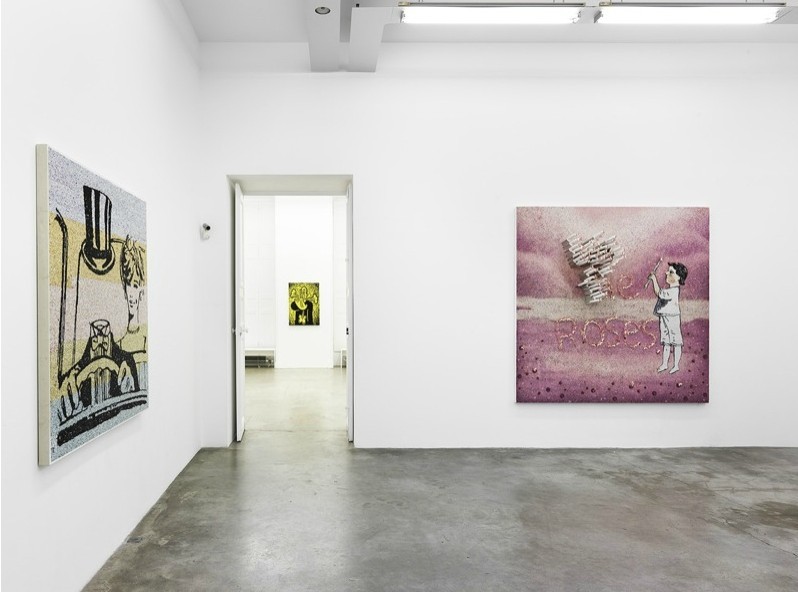Farhad Moshiri
23 Jun - 28 Jul 2012
FARHAD MOSHIRI
Fire of Joy
23 June - 28 July 2012
Galerie Perrotin is proud to present the solo show by the Iranian artist Farhad Moshiri, “ Fire of Joy “ from 23 June to 28 July 2012. After twelve years in Los Angeles, where he completed his training at the California Institute of the Arts, Farhad Moshiri now lives and works in Tehran.
Inspired by Pop Art, he has developed a remarkable and hybrid visual language that draws at once from popular Iranian and Western cultures: “The Iranians are searching for their identity. Depending on their mood, they lean towards the East or the West. Iran is undergoing an inevitable phenomenon that complicates, confounds and diversifies traditions. This is why I am just as inspired by the mall or the bazaar as I am by the ornamentation aesthetic that belongs to Iranian culture.”
In the exhibition “Fire of Joy”, the artist continues to draw upon the traditional “feminine” technique of bead embroidery for its ornamental qualities, which he occasionally combines with thick layers of acrylic and gold leaf. He is here playing upon the concept of “happiness”, which for him leaves greater place for sarcasm and cynicism.
Here Iranian craftsmanship and pop culture merge or often confront each other with irony by using as much the advertising aesthetics for housewives of the 1950’s (“Curl”) as the popular western icons of comics (“Uncaged”, “Breath”, etc.) In a country that is mistrustful of representation, Moshiri, like a collector or antique hunter, lifts all kinds of images from daily life such as emblems of kitsch, censored photos, childish motifs and western advertising.
“I like to uncover things that have no artistic pretention, that have been created by others and strive to recondition them in the form of works of art.”
In “Anatomy of a Woman 2”, for example, an icon of Persian tradition is treated like an anatomical image. In “Mystery Man” a face covered with coloured circles refers to the fuzzy faces of censorship and in “God” the word repeated infinitely on extremely coloured and sparkling backgrounds such as luminous signs functions like a slogan. Through these effects of juxtaposition, stereotypes and sacred or taboo references (the female body, censorship, God), Moshiri’s language reveals his powerful dissidence defined in relation with other things in a playful, offbeat manner.
In one of his installations Moshiri collected a thousand key-fobs that form the phrase “See God in Everyone” on one wall and on another, a multitude of knives of different sizes and colours are stuck along with 21 European portraits gathered by Farhad Moshiri from the last century to write the word “Quiet”.
In his installations Moshiri uses the tradition of ready made by gathering found objects, an artistic practice that is entirely ignored in Iran, making use of oxymoron to reveal the ambiguity of a country that is ceaselessly transforming itself.
Fire of Joy
23 June - 28 July 2012
Galerie Perrotin is proud to present the solo show by the Iranian artist Farhad Moshiri, “ Fire of Joy “ from 23 June to 28 July 2012. After twelve years in Los Angeles, where he completed his training at the California Institute of the Arts, Farhad Moshiri now lives and works in Tehran.
Inspired by Pop Art, he has developed a remarkable and hybrid visual language that draws at once from popular Iranian and Western cultures: “The Iranians are searching for their identity. Depending on their mood, they lean towards the East or the West. Iran is undergoing an inevitable phenomenon that complicates, confounds and diversifies traditions. This is why I am just as inspired by the mall or the bazaar as I am by the ornamentation aesthetic that belongs to Iranian culture.”
In the exhibition “Fire of Joy”, the artist continues to draw upon the traditional “feminine” technique of bead embroidery for its ornamental qualities, which he occasionally combines with thick layers of acrylic and gold leaf. He is here playing upon the concept of “happiness”, which for him leaves greater place for sarcasm and cynicism.
Here Iranian craftsmanship and pop culture merge or often confront each other with irony by using as much the advertising aesthetics for housewives of the 1950’s (“Curl”) as the popular western icons of comics (“Uncaged”, “Breath”, etc.) In a country that is mistrustful of representation, Moshiri, like a collector or antique hunter, lifts all kinds of images from daily life such as emblems of kitsch, censored photos, childish motifs and western advertising.
“I like to uncover things that have no artistic pretention, that have been created by others and strive to recondition them in the form of works of art.”
In “Anatomy of a Woman 2”, for example, an icon of Persian tradition is treated like an anatomical image. In “Mystery Man” a face covered with coloured circles refers to the fuzzy faces of censorship and in “God” the word repeated infinitely on extremely coloured and sparkling backgrounds such as luminous signs functions like a slogan. Through these effects of juxtaposition, stereotypes and sacred or taboo references (the female body, censorship, God), Moshiri’s language reveals his powerful dissidence defined in relation with other things in a playful, offbeat manner.
In one of his installations Moshiri collected a thousand key-fobs that form the phrase “See God in Everyone” on one wall and on another, a multitude of knives of different sizes and colours are stuck along with 21 European portraits gathered by Farhad Moshiri from the last century to write the word “Quiet”.
In his installations Moshiri uses the tradition of ready made by gathering found objects, an artistic practice that is entirely ignored in Iran, making use of oxymoron to reveal the ambiguity of a country that is ceaselessly transforming itself.

